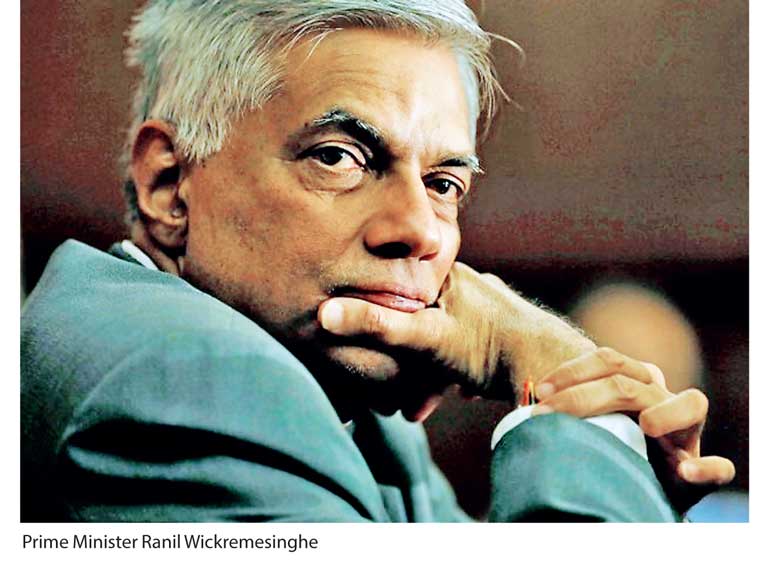Sunday Feb 15, 2026
Sunday Feb 15, 2026
Wednesday, 4 April 2018 00:00 - - {{hitsCtrl.values.hits}}

 It is a simple matter of ethics. If Prime Minister Wickremesinghe hasn’t resigned, it is quite simply because firstly he doesn’t know right from wrong and secondly he doesn’t know how to conduct himself in public affairs in accordance with international norms, including those in Asia and the global South.
It is a simple matter of ethics. If Prime Minister Wickremesinghe hasn’t resigned, it is quite simply because firstly he doesn’t know right from wrong and secondly he doesn’t know how to conduct himself in public affairs in accordance with international norms, including those in Asia and the global South.
He doesn’t think it was wrong to import and implant Arjuna Mahendran, a non-citizen, as Governor of the Central Bank despite the advice of the President and a clear issue of a conflict of interest.
He doesn’t see it as wrong that he defended Mahendran from charges of wrongdoing when the bond scam story gathered momentum and the weight of evidence.
He doesn’t think it was wrong to damage the UNP, the Government and the President by his acts of omission and commission (no pun intended) in this regard.
He doesn’t think that he should accept responsibility for a huge error of judgment which led to massive financial losses to the country.
He doesn’t believe in apologising, taking responsibility for his huge mistake and resigning.
In short his standards of political behaviour and conduct in public affairs leaves much to be desired.
So the no-confidence motion is going down to the wire. Some parties will make their decision only on the day itself. This isn’t good because it means that there is no compromise in sight—the only possible compromise being the voluntary resignation of the Prime Minister, just as the President of Peru resigned a few weeks ago, to spare his government precisely such a trial by fire in the legislature, on grounds of countenancing corruption. The absence of such an exit from the crisis in Sri Lanka reveals the inflexibility and intransigence on the part of the PM and his party the UNP.
There is a major difference between adherence to principle on the one hand, and rigidity on the other.
An analysis of the rise of extremism and the attendant phenomenon of violent upheavals throughout the world and over time, show that two factors play a major causative role. One is the inflexibility, rigidity and intransigence of the establishment. The other is the unwillingness or inability of liberal reformers to prevail over such intransigence.
The Sri Lankan situation is demonstrating the presence of the first of these two factors. We shall see on 4 April whether or not the second factor is also present.
Those of us who do not wish to see the growth of extremism in our society once again have to wish and work for the factor of intransigence to be replaced by flexibility or for the moderate reformers to be willing and able to prevail over the dogmatically inflexible.
Translated into simpler political terms, we have to hope that either the PM steps down or that the SLFP and the UNP dissidents are sufficiently strong, numerous and determined to join the JO in prevailing over the PM’s intransigence and the UNP’s dogmatically conformist loyalty to him.
While flexibility usually ensures survival either by being as supple as the bamboo or capable of generating change from within, rigidity leaves only three possibilities of change—explosion, implosion or crack-up (rupture).
What does Prime Minister Wickremesinghe and the UNP parliamentary group’s rigidity reveal? It reveals three characteristics. One is ossification—the inability to generate change. They are stagnant and static. The other is that of arrogance. The third is myopia, the inability to see beyond their collective nose.
If the PM does not resign and manages to squeak past the no-confidence motion, how is he going to govern? The SLFP or most of it will leave. The Government will crack up.
It will also lose its two-thirds majority. The Joint Opposition and Sri Lanka Freedom Party will form a strong opposition. The Judicature Act (making for Special Courts) has already been deemed to need a two-thirds majority in Parliament since some of its clauses are inconsistent with the Constitution. Even legislation which needs only a simple majority may be blocked by the President.
Soon, the PM and the UNP, with or without the TNA, will run into stormy weather. There have been periods like this when the UNP was well past its midpoint and headed rapidly downhill though it didn’t know that. The years 1953-1956 and 1967-1970 are cases in point.
It is not only the UNP which has experienced this accelerated downturn. I vividly recall the United Front government of Madam Bandaranaike in 1974-1977, from the Government Printer’s strike through to the Peradeniya student shooting, the student uprising island-wide, the railway strike, the general strike and the break-up of the Government. Radicalisation is rife at this stage of the game.
Only Ranasinghe Premadasa was able to turn things around even at this late stage but he had been Prime Minister - and a dissenting one - for a whole decade before he was given the presidential nomination in 1988.
However, if Sajith Premadasa were given the presidential candidacy in 2019, he would be unable to turn things around because the damage done by Ranil Wickremesinghe to the economy and the party would be far greater than that done by the Jayewardene administration.
If the PM squeaks through today’s no-confidence motion, he will not regain social legitimacy or popularity, nor will his and Mangala’s economic policies win the Government any votes. The UNP will lack the social shock-absorber and human shield that the SLFP provides because it will leave the Government, so keen is it to put a distance between itself and the socially toxic Ranilist UNP which brings in its wake a predictable electoral disaster next year.
Reports disclose that President Sirisena warned the UNP against propping itself up with TNA votes in Parliament. Evidently, a UNP Minister was shocked and said that the President has forgotten his own reliance on the TNA in January 2015.
“Sirisena had also warned the United National Party (UNP) that it would be political suicide for Wickremesinghe to defeat the no-confidence resolution by getting the votes of the Tamil National Alliance (TNA). Leaning on the main minority Tamil party would alienate the nationalist vote of the Sinhalese majority, Sirisena had argued, only to be told that he too had won the January 2015 election thanks to the minorities, including the Tamils.” (EconomyNext, 3 April 2018).
What the UNP fails to understand is that (a) 2018 is not 2015 (b) A presidential election is not a motion of no-confidence on a vast fraud and (c) Maithripala Sirisena, the General-Secretary of the moderate nationalist SLFP and former acting Defence Minister (on occasion) of a war winning administration, is not Ranil Wickremesinghe. When Maithripala Sirisena obtains TNA support, the optics are quite different from when Ranil Wickremesinghe does so (and on a shameful bond scam too). Sirisena could afford to; Wickremesinghe cannot.
If it is propped up by the TNA today, Ranil’s UNP which already has a target painted on its front, will have another painted on its back. TNA support may keep Ranil afloat in Parliament for the moment, but it would sink the UNP at upcoming elections and thereby sink itself as well.